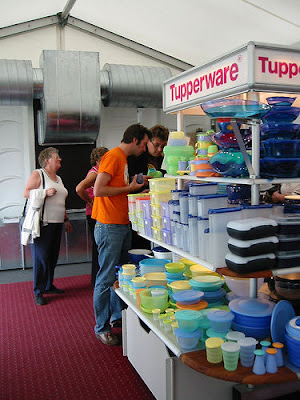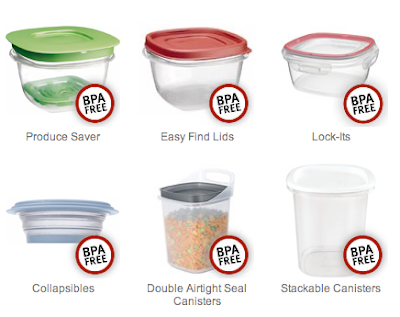
Are plastics safe for food storage? I last addressed this question back in January 2007, so here's an update.
As you might suspect, there is no one absolute answer to this question. Much of the current concern centers around BPA, which is found in many hard plastic containers used for food. The FDA declared that BPA is safe, but recent disclosures show that the FDA relied on information from chemical industry lobbyists to reach that conclusion. Many are concerned about BPA's toxicity; some cities and states have banned the chemical in baby bottles and sippy cups, and now Congress is once again considering banning it in all food and beverage containers.
BPA is found in many polycarbonates; polycarbonates (and some other plastics) have recycling code #7. But BPA has also been found to leach from other plastics when microwaved. "There is no such thing as safe microwaveable plastic," said Frederick vom Saal, a University of Missouri researcher. [quoted from the Milwaukee Journal Sentinel]
Caroline Baier-Anderson discusses, a health scientist and an assistant professor in the Department of Epidemiology and Preventive Medicine at the University of Maryland, Baltimore concurs: "It is best not to microwave plastics, particularly since alternatives are widely available."

If You Want to Use Plastic Food Storage
Based on what we know today, some plastics seem to be safer than others. The Green Guide will help you pick the best plastic products. And manufacturers are generally quick to tell you when their products are BPA-free. Update on July 20, 2011: The Green Guide seems to have disappeared, but over on GreenerPenny Mindy Pennybacker - the prior editor of The Green Guide and co-founder of thegreenguide.com - explains about safer plastics. For similar information, with an easier-to-read format, see Care2; the information here is adapted from thegreenguide.com.
Rubbermaid tells you which of its products contain BPA; most do not. (The photo above shows just some of Rubbermaid's BPA-free products.)
While Tupperware claims BPA is safe, the company also provides you with the recycle code for each of its products. Update on March 17, 2014: As of March 2010, items sold by Tupperware US and CA are BPA-free.
OXO says all of the company's POP containers are BPA-free.
Preserve food storage is made from 100% recycled plastic and is BPA-free. It's a #5 plastic, one of the better options. [via Apartment Therapy]
GladWare containers do not contain BPA, nor do Ziploc containers.
If You'd Prefer to Avoid Plastic

One option is stainless steel. LunchBots are stainless steel containers with stainless steel lids.

And here are some airtight stainless steel food containers - unfortunately, round instead of rectangular. Update on July 20, 2011: The site that I found these on no longer has them - but they seem to be the ONYX containers, available here and here.

If you're willing to have plastic lids (#4, one of the better plastics), you could consider these rectangular stainless steel food containers.

Another option is glass. Anchor Hocking's kitchen storage is glass with BPA-free plastic lids; if you want glass lids, too, look at the Bake 'N' Store bakeware, shown above. The Container Store also has glass storage with glass lids.

And of course Pyrex has food storage products - with plastic lids, which the company says are BPA-free. For not-too-crazy prices you can also get vintage Pyrex with glass lids, such as the pieces above, found at Ruby Lane.
[photo at top of post by jerrroen / Jeroen, licensed under Creative Commons]

9 comments:
I gave lunch bots to a client last December, one who I know does not like plastic in contact with her food, ever, and who teaches design. She loves them. They are chic, and functional (though not completely moisture-proof if turned upside down in a backpack).
Newleafnews, thanks for letting me know. The LunchBots sounded pretty great, but there's nothing like hearing about someone's actual experience with them.
Dan from New Wave Enviro Products sent me an e-mail and pointed me to the company's stainless steel food containers - so there's another option.
I had no idea about plastic storage and its effects on food. Thank you so much for posting this valuable information.
Jennifer, you are very welcome. None of the information is as conclusive as we'd like - but understanding what is known lets us make informed decisions for ourselves.
I like glass for storage, but stainless steel is good, too. The New Wave Enviro Product mentioned in your previous comment looks useful.
Fortunately, we have a great selection of stainless steel food storage options in Los Angeles at several stores in the Little Tokyo neighborhood.
Thanks for this wonderful, informative post! Definitely something we should be mindful of when shopping for containers. I wasn't aware of The Green Guide, so I'll have to check that out.
Cynthia, the only problem with stainless steel is I can't pop it in my microwave!
Carmen, you're welcome! Researching and writing this was very informative for me, too! I knew there were some concerns about plastics, but I was awfully fuzzy on the specifics.
Thank you for organizing this information! I wanted to find a quick source for all-glass food storage containers, and everything I needed was on your blog. :)
Post a Comment